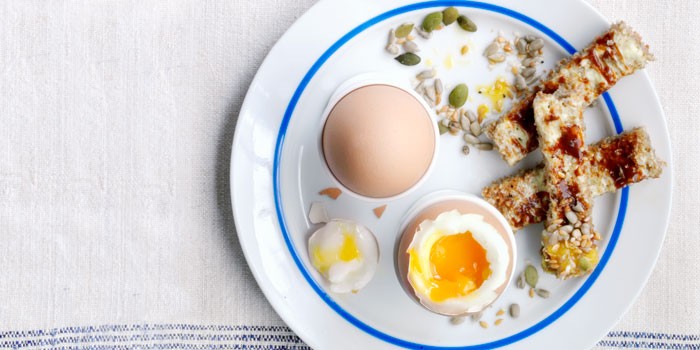Although raw eggs are commonly used in bodybuilding shakes and smoothies, it is not recommended to consume them. This is because the proteins in raw eggs are not easily digestible by the body until they are converted into a more easily absorbed form.
Cooking vegetables makes them safer to eat and allows your body to absorb some of their essential nutrients more readily. Furthermore, it helps prevent cholesterol from oxidizing, which has been linked with an increased risk of heart disease.

There are several reasons why eggs should be cooked instead of eaten raw for optimal nutrition and safety:
- Eliminating harmful bacteria: Raw eggs may contain harmful bacteria such as salmonella, which can cause food poisoning. Cooking eggs thoroughly can eliminate these bacteria and reduce the risk of illness.
- Improved protein digestion: Cooking eggs denatures the proteins, which makes them easier to digest and absorb. This is particularly important for individuals with digestive issues or those who have difficulty digesting raw protein.
- Increased availability of nutrients: Cooking eggs can improve the availability of certain nutrients such as biotin, which is important for healthy skin, hair, and nails. Cooking also increases the bioavailability of other important nutrients, including iron and zinc.
- Taste and texture: Many people prefer the taste and texture of cooked eggs over raw eggs, which can be slimy and unpleasant.
In summary, while raw eggs may be a convenient and quick source of protein, cooking them can significantly improve their safety and nutritional value. It is generally recommended to cook eggs until both the white and yolk are firm to ensure they are safe to eat.
1. Protein
Eggs are one of the world’s most nutrient-dense foods, boasting an abundance of vitamins and minerals. Raw pasteurized egg yolks and whites contain protein as well as vitamin A, B12, potassium, magnesium, iron, zinc, carotenoids, healthy fats like omega-3 fatty acids – making them one of the healthiest options available to consume.
Consuming raw eggs may not be advised for those with weak immune systems, pregnant or nursing mothers, or those at risk of bacterial infection. To minimize your chances of food poisoning, store eggs in the refrigerator, consume them within a few hours of preparation, and wash your hands before and after handling raw eggs.
It is recommended to cook eggs instead of eating them raw, as raw eggs contain bacteria which can lead to food poisoning in certain individuals. Fortunately, most people do not experience this issue when consuming raw eggs.
Another advantage to cooking your eggs is that they become more digestible than raw ones. This occurs because heat causes structural modifications to the proteins within them, weakening their bonds which make them easier to break down and digest.
Due to this increased digestibility, your body can more readily absorb the protein found in cooked eggs than it can with raw eggs. A study revealed that 91 percent of the protein in cooked eggs was digestible versus only 51 percent for raw eggs.
Furthermore, heating eggs can damage the protein avidin in eggs, denature its ability to bind with vitamin biotin in your body and prevent absorption. This could result in a deficiency of biotin which is essential for several metabolic functions.
Eating a variety of whole, unprocessed foods is the best way to ensure you’re getting all of the essential nutrients your body requires. For more information about raw nutrition, check out our page on eat raw.
2. Vitamins
Raw eggs can be a great protein source for athletes, but eating them raw can be unhealthy. Not only do they contain bacteria which could lead to foodborne illness, but cooking also breaks down certain proteins which may be harder for our bodies to digest. Cooked eggs also make for easier snacking!
Cooking also releases biotin, a water-soluble vitamin essential for hair and nail growth, nervous system health, and carb processing. Additionally, this nutrient aids muscle growth as well as recovery after workouts.
Eggs are an excellent source of choline, an essential vitamin for healthy eyes. Additionally, they supply lutein and zeaxanthin – two powerful antioxidants which shield our vision against cataracts, related diseases, and aging.
However, eggs also contain high levels of cholesterol which may increase our risk for heart disease if consumed in excess. Therefore, it’s wise to cook your eggs thoroughly before consumption.
Cooking an egg breaks the protein into smaller, more easily digestible clusters that are easier for your body to absorb. While this may reduce other nutrients in the egg, it won’t reduce its nutritional value or overall nutritional quality.
While raw eggs may offer some health benefits, they can also pose risks to those with compromised immune systems or pregnant women. This is especially the case if the raw eggs have been exposed to foods contaminated with salmonella bacterium – a type of bacteria which has the potential for serious illnesses and even death.
To guarantee your eggs are safe, purchase them from a reputable grocery store and have them pasteurized. Furthermore, avoid storing your eggs at room temperature as this encourages bacteria and other microorganisms to grow.
Eggs offer many health benefits without compromising flavor, but to get the most benefit you must be patient and willing to cook them. For best results, use a nonstick pan with little or no added fat and soft boil or scramble your eggs before enjoying them.
3. Minerals
When searching for a nutritious food that’s high in protein, vitamins and minerals as well as choline, eggs can be one of your top options. A large egg provides around 27% of your daily value of choline, plus it also contains lutein and zeaxanthin which help protect eyes by decreasing the risk of eye-related health problems.
Eggs are packed with essential vitamins and nutrients, but it’s best to cook them before consumption. Raw eggs may contain bacteria which could lead to Salmonella food poisoning if eaten raw, according to the Centers for Disease Control and Prevention (CDC).
It’s essential to note that eggs contain more bacteria than many other foods, so cooking them is necessary to reduce the risk. Furthermore, some people may become allergic to eggs.
Additionally, eggs are better absorbed when cooked – especially when eaten along with other nutritious foods.
Minerals are naturally occurring solid substances with a distinct chemical composition and ordered internal structure, commonly referred to as crystal form or morphology.
Minerals can be found in rocks, soils, sediments and water. They’re also employed in the manufacture of various products like glass, ceramics and metals.
They play an essential role in the production of certain substances, such as blood cells and the human nervous system. Furthermore, they’re responsible for several vital bodily processes like hormone production and fat release from stored fats.
Though some minerals can be created by adding other elements, most are created through the combination of natural elements with carbon. Calcite, for instance, is a mineral created by mixing calcium with carbonate (CO3).
Silicates are another type of mineral composed primarily of silicon and oxygen. Over 90% of Earth’s crust consists primarily of silicate minerals such as quartz and feldspar.
Artificial minerals can be created for cosmetics, pharmaceuticals and other health-related uses. The International Mineralogical Association – the world’s premier organization for naming new minerals – has officially registered almost 5 400 different minerals on their register.
4. Fat
Eggs are an excellent source of protein, vitamins and minerals as well as essential fatty acids. They provide various beneficial nutrients like vitamins B6, C, E and folate; minerals like iron, copper and potassium; antioxidants like carotenoids; as well as omega 3 fatty acids.
Raw eggs have become increasingly popular due to their nutritional content, but they should always be handled carefully. Raw eggs may contain Salmonella, which causes approximately one million cases of food poisoning annually in the United States alone.
Raw eggs may harbor bacteria which can be spread when people crack the shell or pass the yolk between two shell halves. If you’re concerned about this risk, opt for pasteurized eggs instead – but make sure you purchase them from a reliable seller.
Cooked eggs are healthier for you than raw ones because they’re exposed to low heat for a shorter duration, keeping their yokes intact.
Cooking eggs can also deplete them of some essential vitamins and minerals, particularly vitamins A, D, and E. This makes them less effective at combatting diseases like cancer as well.
Furthermore, eggs cooked at high temperatures may contain glycotoxins – chemicals linked to chronic diseases like diabetes and heart disease. As such, those suffering from these ailments should avoid eating eggs.
Another advantage to cooking eggs rather than eating them raw is that their nutrients can be more easily absorbed when cooked, giving your body more of them for use. Not only does this strengthen your immunity, but it may also increase energy levels.
Additionally, cooked eggs contain higher levels of protein – an essential nutrient for muscle growth and repair. Your body cannot produce enough of this essential nutrient on its own, so you need to get it from food sources.









